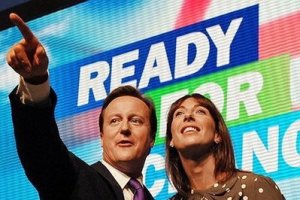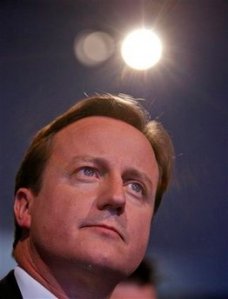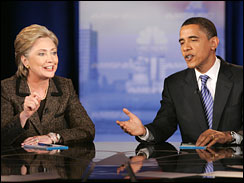Just a reminder that I’m now switching to a permanent home at www.thehorsellsmouth.com. I’ll keep this blog open for a couple of months before deleting it.
Voice of experience
October 11, 2009 — simonashall
Jonathan Lord
Last week, my post on Jonathan Lord’s selection was taken down by someone hacking into my WordPress account. Very petty. It also raised hackles that I appeared to “forget” that there was an election for us to fight if he was to become the next MP for Woking. No, I haven’t forgotten that, hence my many, many posts on the next election. The point about elections, for those who haven’t forgotten that they are happening but have perhaps forgotten how to win them, is to convince as many people as possible that a candidate is the person who will best represent their views and interests.
I am confident that in Jonathan, we have a candidate who is experienced in campaigning, who is an excellent performer on the doorstep and who talks with people easily and fluently about the issues that concern them. Hence, I believe he will be the next MP for Woking – if you can’t say that about the candidate you are campaigning for, why on earth would you be campaigning for them?
Today I went to a very enjoyable lunch event at the house of Cllrs Michael Smith and Anne Murray, which was well-attended and at which Jonathan spoke eloquently and spontaneously about the challenges we face as a party and a country. It reminded me again of the reason that he was selected – at the Open Primary he captured the imagination and support of the hall and was a clear winner on the night.
His CV is impressive – he has been a deputy leader of Westminster City Council, one of the country foremost local authorities and ran Anne Milton’s successful campaign to re-capture Guildford in 2005. All the evidence based on recent electoral history told us that the Liberal Democrats should have held onto Guildford – but they didn’t because of Jonathan’s excellent campaign and those involved in it. In June, he was heavily involved in the Guildford county campaign where the Liberal Democrats were pushed out of two Guildford seats and a third, Worplesdon, was turned from a marginal into a safe seat.
He is a proven campaigner, a superb speaker and is excellent one-on-one with people. He is local – I know that won’t stop his opponents trying to place Guildford as 40 miles away instead of four – and he will become more so as the campaign progresses. We know that the Liberal Democrats are targetting Woking, having given up in Guildford not in small part due to Jonathan’s efforts. I don’t blame them – but we will be ready with a candidate who they are going to have to work harder than in Guildford and South West Surrey combined if they are to beat.
Today, the Horsell and Woodham branch that saw Ben Carasco elected in Horsell pledged it was 100% behind Jonathan Lord in Woking and I am confident that with a smart strategy and dedicated teamwork we will be able to put Woking out of reach of the Liberal Democrats. But whatever the result, it should be one hell of a campaign and I for one am looking forward to it.
On tightening polls
October 11, 2009 — simonashall
Will it be a closer race as the election approaches?
Cllr Denzil Coulson responded to my post on the seventeen-point post-DC speech poll lead with a Tweet that a 45% Conservative poll rating at the next election was “very unlikely”. Lo and behold, another poll put the Conservatives on precisely 45%, which I duly tweeted for his attention.
“You and I know that polls tighten during the election campaign”
came the response via Twitter and it’s not an unreasonable one, so I thought I’d look into it, starting in 1992. Back then, polls weren’t as frequent or, as we subsequently came to realise, as accurate as now. But looking seven months out from John Major’s photo-finish election win, ICM/Guardian on 14 September had Con 39, Lab 39 and LD 17. That was the same result in MORI/Times 10 days later. By 12 October, there was a Lab 43, Con 41 LD 12 poll done by ICM/Guardian. I’m not being selective – those are the polls I can find. In the end, the result was Con 42, Labour 34, LD 18. Not much sign of a tightening there – except for one away from the October 12 ICM Labour lead.
In 1997, it is a slightly different story. A November 1 MORI poll has Lab 54, Con 30, LD 12 and a Lab 47, Con 34, LD 15 poll followed the next day by MORI. All other polls in November had Labour above 50 and the Conservatives on around 30. The final result – Lab 43 Con 30 LD 17 – is indeed a tightening of the polls seven months out; but which way are the polls tightening? As in 1992, the move was away from Labour as people who, when questioned, said they would vote Labour stayed at home.
In 2001, four polls in December put Labour on around 46, the Conservatives on 33 and LDs on 15. The actual result – Lab 41, Con 32 and LD 18 – was similarly due to Labour voters staying at home, a lack of enthusiasm for the Conservatives and aggresive Lib Dem campaigning. Yes, a tightening – but a tightening away from Labour. During the last election polls seven months out showed Labour at around 38, the Conservatives on 31 and the Lib Dems on 21. The election result was Lab 35, Con 32 and LD 22 – very close to the polling figures in November.
A few things to note:
1) The Labour vote has always been lower in the election than the average polling figures seven months out, probably due to lower turnout among Labour voters
2) The Conservative vote in polls seven months out since 1992 has been very close to the results on the night
3) The Lib Dem vote has always been higher in elections than polls because they campaign so well
It is also worth stating the obvious – that it depends which polls you look at and where the votes are cast is more important than how many are cast. But the evidence above suggests that Labour’s percentage on the night will be lower than their current polling, that the Lib Dems will do better (just as well given that they are on 16% today)and that the Conservative vote will hold around about where it is now ie the average for the month.
We are, of course, all hostages to fortune and whatever surprises the next seven months may hold. But a quick glance through records shows that the Lib Dems relying on a tighening of polls during an election campaign to produce a hung parliament might be a little misguided. It’s still a possibility if we don’t work hard enough, though.
The seventeen-point strategy
October 9, 2009 — simonashallI didn’t get too excited about the nine-point lead yesterday and I won’t get any more excited about a 17-point lead today. It’s still daily poll, about which I am yet to be convinced, and it comes on the day when DC has received more press coverage – largely positive – than any other.
We saw George Osborne’s speech following by a bounce and then a reality-checking un-bounce. The Labour spinners are out in force over DC – that he has called every single economic decision wrong (although the public appears to reject that) and that his wealth means he can’t understand the concerns of ordinary people. I think this last point will have some resonance but generally only to reinforce antipathy in the minds of those already likely to vote against him ie people will agree with it but still vote for him.
Around 45% is where the Conservative Party needs to be in order to be sure of a decent majority in May. I believe the chances that we will be the largest party after the next election are 99.9% – something extraordinary would have to happen to prevent that. But the electoral system is weighted hugely in Labour’s favour – as I mentioned yesterday, 40% for the Conservatives and 31% for Labour produces a Tory majority of four; if you reverse those figures, Labour gets a majority of 124. There is still a significant chance that despite a good poll lead, DC could face a hung Parliament.
Polls tend to tighten as we go into elections. Sometimes they come out again, as in 1992 and 1997. But in 2005, they got even closer. Conservative high command needs to know that until we are on 45% regularly, anything can happen. They need a really, really effective campaign lined up – with a Cameron bounce every day – to be sure of a majority in the House of Commons worth having.
And in the Parliament we’ve got coming, it’s really important that we don’t end up with a minority government that can be blocked into a stalemate. There’s a lot of hard work ahead in every consistuency.
Comparing the speeches
October 9, 2009 — simonashallAn interesting analysis over at Tim Dodds’s Lightwater blog on the leaders’ speeches. I’ve commented.
Cam’s the man
October 8, 2009 — simonashall
The Camerons after DC's speech
I’ve now had a chance to watch DC today and I’ve got to say that I was pretty impressed overall. To a certain extent, he’s played it safe – no new policy and not too much fire in the belly (no-one likes an angry man) except for poverty, where people will think he’s right to be angry. I was impressed with his fluency as always and also with his humanity and straightforwardness. The voters wanted honest, they wanted straightforward, they wanted transparent. Is DC perfect? No – but I think this is about as close as we’re going to get to any leader meeting those requirements.
So overall I was very happy with his vision and values – he appears to understand that voters want a Conservative government that belives in free enterprise, in wealth creation, a small government and low-tax economy but they will not tolerate that at the expense of social injustice, reduced public services, increasing gap between rich and poor and unfettered corporate greed. I think DC projected that sentiment well today.
But he has got a couple of challenges. Firstly, like any opposition leader he can’t show that he is as good as his word until he gets elected – but he would find it easier to be elected if he could demonstrate he was as good as his word. Trust is an important factor in any opposition leader – and let’s not forget no Conservative has been elected from opposition for 30 years. DC has that trust personally but I don’t think the public yet trust the Conservative Party corporately in the same way; it’s a very fine line to tread and there is opportunity here for PM and the PM to locate inconsistency. And every inconsistency will have a dampening effect on DC’s personal trust level, even if it’s nothing to do with him. We need to stay consistent to maintain trust.
In addition, I still feel that the economy is weak point – unusually – for the Conservatives at the moment. Back in 1998/9, when Tony Blair wiped the floor with us about who was more trusted to run the NHS, the education system etc, the economy was usually the only element on which the Conservatives scored well. Ironically, it’s now the one area where Labour still has a chance – partly because of the above ie they’ve had the opportunity to demonstrate action but also because we have a Shadow Chancellor who’s about as economically literate as I am. Luckily, we also have Philip Hammond and Ken Clarke on board, who do understand economics – but it’s hardly ideal.
Finally, there’s the wealth thing. DC isn’t going to escape the jibes over his privileged upbringing or personal wealth (or that of SamCam). I have to say I find it very strange that Labour and the Liberal Democrats think it’s okay to say someone isn’t fit to govern because of their background or schooling. We don’t say that Labour MPs are unfit because they grew up in poverty on a council estate or Liberal Democrats because they went to third-rate universities – so why should it make a difference that DC went to Eton and Oxford?
Many great PMs have come from Eton and Oxford and most have had comfortable, if not substantial wealth – if he’s up to the job what’s the problem? I don’t believe you have to be on a low income to understand the problems of it – nor do I believe you have to be state-educated to be passionate about state education, nor a user of the NHS to “love” the NHS (as it happens, DC has been a user of the NHS). To my mind, reverse snobbery is just snobbery – and I think people will see through it a la Crewe and Nantwich.
I think the Conservative conference has undoubtedly been the most successful of the three. There is still work to do to cement the trust with voters and DC will be vulnerable to certain lines of attack. But I think he’s done enough to convince people he deserves a chance as the next PM.
The nine-point plan
October 8, 2009 — simonashallI don’t think that daily polls tell us much of a story anyway but the news that the Conservative lead over Labour is back into single figures isn’t surprising or worrying to me.
Despite everything that has happened during the past 18 months, George Osborne’s speech on Tuesday outlining cuts that need to be made if we to have any chance of bringing the country’s huge debts under control, will have come as a shock to some people. They probably don’t read a newspaper or listen to the news and use the internet for other things. The simple fact is that not everyone is going to understand the context of George Osborne’s message – for some, it might become clearer later – others will never see the necessity for spending reductions.
Others will understand the message and will have decided that they don’t like it much. Included in that may be thousands of public sector workers who fear for their jobs. For them, the Conservative message could be pretty glum – although it’s a glumness that we in the private sector have had to manage for the past 18 months. Today in the FT, there is an advert for a Deputy Head of Internal Audit at the DfT for £80,000 + benefits and in the Local Government Chronicle for an Interim Change Manager at £35-43k. I could go on.
This stoking of the public jobs market that Labour has indulged in not only has to stop – it has to be redressed. There are, for example, 99,000 soldiers in the Army and 85,000 officials in the MoD. That’s the equivalent of each soldier having a 0.85FT official to look after their needs – it’s clearly ridiculous. And turkeys won’t vote for Christmas – what is important is the creation and expansion of alternative economies for people to move out of the public sector into.
If you put 40%, 31% and 18% into Electoral Calculus, you still get a Conservative government – albeit with a majority of four (the same nine-point lead for Labour produces them a majority of 124). But I’d rather have a Conservative government that will sort out our national problems with a razor-thin majority than a Conservative government that tells people what it thinks they want to hear with a majority of 124.
If people then vote for five more years of Gordon Brown’s denial and escapism, they will get everything they deserve.
Moving again…
October 7, 2009 — simonashallFollowing the hacking of my blog last weekend, from the beginning of next week this blog will change to a permament home at www.thehorsellsmouth.com. I’m using the WordPress software still, so it will look and feel almost exactly the same but the move has allowed me to introduce some far tougher security.
Sorry about the moving around – I started at Blogspot not really knowing whether blogging was for me and whether I could keep regular updates. Then I realised I could and moved to WordPress because it was a great deal more attractive, easy to edit and because those who wanted to interact with the posts needed to register themselves and their identities. I would never refuse a comment unless it was unlawful or libellous and I don’t have an issue with people insulting me and my views – but I demand that they be open about their identities, as I am. It’s basic fair play.
I’m pleased to say that the majority of comments on my blog are not only polite but make a good (mostly balancing) contribution. Some are frostier than others, but hey – it’s not personal, it’s politics. The new hosted website will I hope allow us to continue the debate.
Right on the money
October 7, 2009 — simonashall
Seeing the light? DC need to deliver the speech of his life - again
The technical problems on my blog have prevented a more in-depth following of the Conservative conference but here’s how I see it up to today. Firstly, I thought that Rachel Sylvester did a great piece in The Times yesterday on the mixed messages of the first couple of days of the conference. I can’t complain that there weren’t any policy ideas – in fact, there have been so many that the government has been forced to rush out some of its own – but the problem with policies is that they often contradict each other (“Tough on crime; tough on the causes of crime”, anyone?) Spread out, no-one notices but releasing them all so close together draws a more prominent relief of any inconsistency.
Having said that, what I’ve heard has been pretty sensible given the financial circumstances. In 1997, it was easy for New Labour to come up with big ideas and schemes; this time, with the country in economic dire straits it’s a lot more difficult. I support the idea of benefits being cut to fund education and training – it’s the difference between economic opportunity and economic slavery. I support a long-term view of working conditions that preserves pensions but needs us to work longer for them. I also support the measures that have been put in place to support small enterprises, which create wealth, jobs and investment in this country.
I’m delighted beyond all measure that the message that I have been telling everyone who will listen should be put out is finally being delivered – that after 12 years of Labour spin, spite, incompetence and centralisation spattered by the odd moment of common sense, the Conservative Party is the party who will be honest with voters, tell them about the pain ahead and take them through what is going to be an agonising Parliament. George Osborne isn’t my favourite member of the front bench – I’ve got far more time for Runnymede and Weybridge MP Phillip Hammond, who is a real asset and should be chancellor – but his speech yesterday was dead on the money.
And it was vitally, vitally important that he delivered a well-judged message in an appropriate way. There’s still a fair hint of arrogance about his speaking method but the content was absolutely right and I suspect the voters would rather vote for an arrogant man with good ideas than a humble man with no clue.
As Nick Robinson (who else?) points out, it’s a significant political gamble to announce cuts and tough times ahead but I think people are resigned to it and it will give the Tories acredibility lacking in the current government (and Vince Cable, who just wants to tax your mansion). This country, once again, needs to be rescued from Labour overspending by a Conservative austerity regime. Am I looking forward to it? No. It is fair that public sector workers will have to cope on frozen pay? No – but then I’ve not had a pay rise this year, either. Is it fair that they should lose their jobs? No – but this is Labour’s mess and they should remember that when they cast their vote.
Labour created tens of thousands of silly jobs in the public sector that were unsustainable to fund in the long-term. Now the party is over, those stuck in them are going to have to pay Labour’s debt. It’s a shocking betrayal – but I bet Labour (in opposition) won’t see it that way.
It is also interesting to note that despite the policies coming forward, we’ve had comparitively scant negative reaction in the mainstream media – let’s leave the Grauniad and Mirror aside. Instead, the BBC has contented itself with Chris Grayling’s mishearing of questions, the appointment of Gen Sir Richard Dannat and the When Boris Met Dave silliness on Channel 4 (although calling them mainstream is a little generous) tonight.
This reflects various things, I suspect. A quiet conference day in the build up to DC’s speech tomorrow – although this usually gives space for some criticism. There is also the realisation that the next government is almost certainly going to be a Conservative and journalists getting used to buttering up the other side. But also I think there’s an unspoken feeling at conference from the websites, papers and Twitter, that Britain has been buffeted, bungled and betrayed by Labour and that Conservative support might, as Rachel Sylvester suggests, be fragile – but they do actually have some half-decent ideas to try and restore our national self-esteem.
Purpose and clarity – there is still work to be done. But I think DC knows what needs doing tomorrow.

You must be logged in to post a comment.